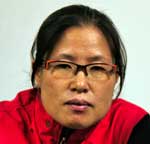After mass firing
Korean workers come to the source
By
Deirdre Griswold
New York
Published Nov 2, 2008 8:45 PM
|
Hyewon Chong
WW photo:
Deirdre Griswold
|
When 300 women workers who manufactured SIRIUS satellite radios in Seoul, South
Korea, were all fired for forming a union, they vowed to fight for their
jobs.
That was on Aug. 5, 2005—more than three years ago—and they are
still fighting.
In mid-October, a delegation of six people from the Korean Metalworkers Union
visited New York to seek justice from SIRIUS. For days, they and allies from
Korean community and labor groups picketed the firm’s corporate
headquarters in a gleaming glass and steel building near Rockefeller Center,
trying in vain to get the company to sit down with them. They wanted to know
who was responsible for the decision by SIRIUS’s Korean affiliate,
Kiryung, to fire the workers.
“On June 7, 2008, Kiryung had come to a tentative agreement to reinstate
us as contingent workers,” Hyewon Chong, one of those fired, told Workers
World. “We would become regular workers one year later, so the union
agreed. But then the company said its board of directors refused. So the
workers started a hunger strike. Two of the women fasted for 94 days and were
hospitalized.
“During the bargaining, Kiryung Co. said it had been told by SIRIUS to
close all production lines in South Korea and move to China.
“They told us lies. They said there were no production lines left in
Korea, so we can’t reinstate you. But we investigated and found five
other production sites. Because the company keeps lying and makes no effort to
settle, we’ve come here.”
The women found out that at exactly the same time they left South Korea, the
company sent goons to the site of the workers’ sit-in outside the factory
gates to beat people up.
More than 64 percent of all workers in South Korea are considered
“precarious”—that is, they have no contract, no seniority and
no rights. The Federation of Korean Industries argues that it has to be able to
fire workers at will in order to be “flexible.”
A major reason the Kiryung workers decided to form a union was the
company’s arbitrary firing policy. “There was an endless stream of
dismissals for the pettiest reasons,” explained Chong. “The boss
just had to say he didn’t like your face, or you were too fat, or you had
asked to go home early. We were dying of overwork but were afraid to take a day
off if we were sick, so people took over-the-counter drugs to keep working.
When one colleague collapsed, the boss said, ‘Go home and rest and
don’t bother to come back.’ The fear of firing gave the company
lots of control over people.”
SIRIUS makes satellite radio receivers and has contracts with some of the
world’s biggest auto companies to install them in its cars and trucks. It
also provides commercial-free programming for a fee and recently merged with
its main rival, XM, to create the second-largest subscription media business in
the U.S.
“The repression against us is so extreme because this struggle is
symbolic for millions,” says Chong. Indeed, companies like SIRIUS think
they can dictate horrendous wages and working conditions all over the globe,
threatening to move from country to country if workers organize and resist.
The Kiryung workers traveled halfway around the world to reach out for support.
Workers here and their unions will be advancing their own struggle against
rapacious corporations by responding.
Articles copyright 1995-2012 Workers World.
Verbatim copying and distribution of this entire article is permitted in any medium without royalty provided this notice is preserved.
Workers World, 55 W. 17 St., NY, NY 10011
Email:
[email protected]
Subscribe
[email protected]
Support independent news
DONATE


